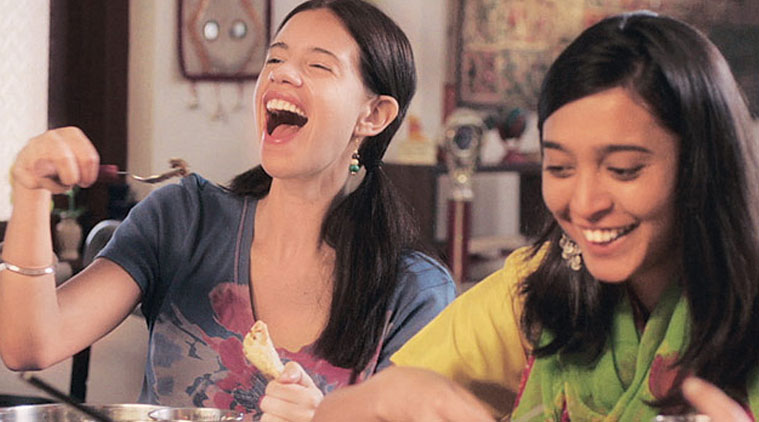- India
- International
‘Margarita With A Straw’ to take a global gamble before India release
Screen takes a look at why new age film-makers prefer to take the foreign route, premiering their films at international film festivals first, rather than showcase them at festivals within the country
 For Margarita With A Straw (directed by Shonali Bose and Nilesh Maniyar), its producer Viacom 18 Motions Pictures decided to take the same route that was adopted for The Lunchbox.
For Margarita With A Straw (directed by Shonali Bose and Nilesh Maniyar), its producer Viacom 18 Motions Pictures decided to take the same route that was adopted for The Lunchbox.
By Priyanka Bhadani
In recent few years, the number of Indian films that have made a mark at the festivals worldwide have grown leaps and bounds. In 2014 itself, films like Titli, Margarita With A Straw, Kaatiyabaaz, Fandry are among the few that have made a strong buzz at some of the popular and sought after film festivals. Last year, The Lunchbox by Ritesh Batra was the undisputed festival king and because of the exposure it got at international platforms, it was embraced by international distributors and managed to cross the Rs.100 crore mark over time.
For Margarita With A Straw (directed by Shonali Bose and Nilesh Maniyar), its producer Viacom 18 Motions Pictures decided to take the same route that was adopted for The Lunchbox. Before Margarita… is submitted to the Censor Board for theatrical release in India, a well-planned festival trip is scheduled for the film that is a story about a girl suffering from cerebral palsy. In fact, Margarita… has already made its presence felt at festivals including the Toronto Film Festival where it got a standing ovation followed by the NETPAC Award and the Busan Film Festival. It will soon be screened at the BFI London Film Festival too.
Ajit Andhare, COO, Viacom 18 Motion Pictures says that the studio wants to make it a “world cinema”. “Which is only possible if it is taken to various festivals internationally,” he remarks and further states that, “Margarita… is not a regular masala Bollywood film, it’s a special cinema with a theme that hasn’t been explored much and to make it commercially viable, taking it to festivals and create the right buzzword is the best route,” says Andhare, who wants to replicate the path taken for The Lunchbox.
Travelling with your film to the festivals world over is the best way to market the film, believes film-maker Samit Kakkad whose Marathi film, Aayna Ka Bayna — a film about nine boys with a lost childhood in a juvenile home run by a tyrant warden who danced to bring their dreams to life— has travelled to 18 film festivals across the world with the result that it is now being dubbed in Hindi for a television premiere on Sony Max — a first for a Marathi film.

And while the festivals prove to be a good platform for films with an off-beat theme, unfortunately, these “made in India” films find recognition on foreign shores even when there are a host of festivals being held in several parts of the country.
While there’s a lot planned at the 16th Mumbai Film Festival that began earlier this week, without being apologetic, organiser of the Festival, Srinivasan Narayan, says, “If you are looking at a big international premiere at the festival, we don’t have any.”
Further explaining, Narayan says that when a film goes for a premiere at a festival, the festival should be capable of propelling it up, giving it an international platform, publicity and marketing. “The fact is that while we are growing as a festival, we haven’t reached a level where we could go for international premieres,” he says.
However, having said that, he also mentions films like Fandry, Ship Of Theseus, Shahid, among others that were screened at the Mumbai Film Festival and went on to become popular at international platforms. “The promotion that MFF gives to Indian films is tremendous but that is not enough,” says Narayan matter-of-factly.
That’s the case with almost all the festivals that are held in India. While they become a good platform to spread the buzzword about a film, they still need to evolve in order to bring business and thus attract more film-makers to opt them as premiere platforms.
Explaining it rationally, Uma Da Cunha, the editor of Film India Worldwide who is also associated with some popular film festivals in India like the Mumbai Film Festival and Kochi International Film Festival, says that mostly film-makers, after showcasing their films at international festivals, opt for a theatrical release (like Margarita... has not been sent to the Mumbai Film Festival).
“It is mostly a marketing strategy,” she says, however, agreeing that there is always a selection panel that decides which films would be showcased at a fest. “How do you question the panel?” she remarks as she brings to fore how almost always there’s issue around the the film selected to be sent as India’s nomination to the Oscars.”
“But then how do you set it right? “Either you choose a panel that has far better credentials or, I personally feel that a director should not be on a selection panel as it is a little difficult for them to be fair and non-judgmental,” remarks Da Cunha, who thinks that the panelists make a lot of difference in the final decision. “It is because of this, many a times good films lose out,” says Da Cunha as she also adds that it is a phenomenon prevalent everywhere. “However, in India because there’s a high quantum of films from many languages, the best way to deal with it is to have smaller panels with highly qualified creative people who are not necessarily from the film fraternity,” she says.
However, the film-makers aren’t complaining much. Vasan Bala, whose film 2012 film, Peddlers got a lot of critical acclaim at many festivals around the world, thinks that the decision to choose an international festival is more because of the business logistics. “It is for a wider reach and better sales,” says Bala, however, also bringing to light how film-makers like him who are pushed aside in the Bollywood industry are respected for their work at these festivals.
But then, it’s not that the Indian film festivals are doing a bad job. “The people associated to them, whether it’s the jury or the organisers or the participants, they are trying their best to elevate films that are beyond Bollywood and Hindi cinema,” says Bala and adds, “At least through these festivals, one is whetting the appetite of the Indian audience for a different kind of cinema.”
The films that are taken to the festivals are usually a departure from what Indian films are usually known for — loud music, masaledar plot and star-studded cast, and speak an international language. That is the reason why Aruna Vasudev, film critic and the organiser of the now extinct Asian Cinefan Film Festival and the editor of Cinemaya, thinks that international film festivals deem fit for such films. “As the themes being picked up to make films are growing, the films are resonating more with international audience,” she says.
In fact, according to Vasudev, it is because of festivals like India International Film Festival, MFF, Ladakh International film Festival, and others held in Kochi, Kolkata, Delhi that the audience for such cinema is growing and creating a culture that was earlier not known. “It’s not that the Indian festivals don’t show films that are picked up or discovered internationally, it’s just that due to marketing strategies decided by the people behind the film, they come to Indian festivals later than the international platforms,” she remarks.
However, Sohum Shah, the producer of Ship Of Theseus that was lapped up at all the festivals it was screened at, says that a lot of times it’s the timing of the festivals on the basis of which the premiere is decided. “We had given our film to both MFF and Toronto Film Festival, but since Toronto happened before MFF, it became the premiere festival,” he says as he mentions that it was at MFF that the film gained momentum.
“Film festivals like Berlin, Cannes or Venice have been around for many years, some for more than 50 years, while most of the festivals in India are still growing,” says Narayan, who refers to the recent troubles that Mumbai Academy of the Moving Image that organises MFF faced in organising the festival after the sole sponsor Reliance Industries backed out. “When we are struggling to organise the festival, the idea of promoting films internationally is a distant dream, but we are on that road. We need to have a good financial backing and a strong public relations to get that in order,” he concludes.
India Abroad: Films That Made A Mark At International Festivals
Margarita With A Straw
Directed by Shonali Bose and Nilesh Maniyar, the film premiered at the 39th Toronto Film Festival and won the NETPAC Award.
Titli
Directed by Kanu Behl and co-produced by Dibakar Banerjee, the film premiered at the Cannes Film Festival 2014 in the Un Certain Regard section.
Katiyabaaz
A documentary directed by Deepti Kakkar and Fahad Mustafa, it premiered at the Tribeca Film Festival 2013 and later at many other international festivals.
The Lunch Box
A film by Ritesh Batra, it was screened as a part of the International Critics’ Week at the 2013 Cannes Film Festival where it received a standing ovation.
Aayna Ka Bayna
A film by Samit Kakkad, it has been screened at 18 International film festivals and mentioned as one of the best films
Ship Of Theseus
An Anand Gandhi film, it premiered at the Toronto International Film Festival in September 2012 and has subsequently been screened at many other festivals.
Qissa
A 2013 Indian-German film, written and directed by Anup Singh, it won the Netpac Award for World or International Asian Film at Toronto International Film Festival 2013.
Fandry
A Marathi film directed by Nagraj Manjule, the film has been applauded at the BFI London Film Festival among many other festivals around the world.
priyanka.bhadani@expressindia.com
Photos
Apr 26: Latest News
- 01
- 02
- 03
- 04
- 05









































